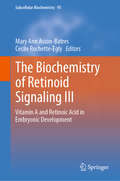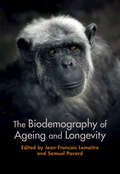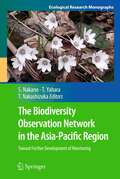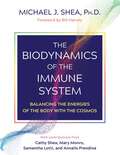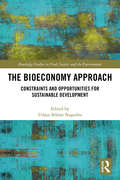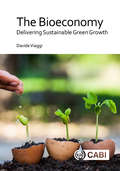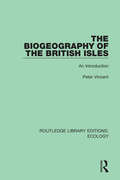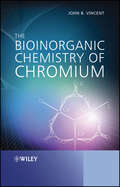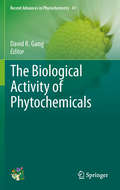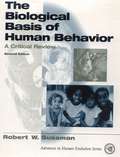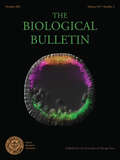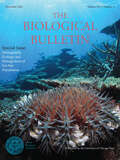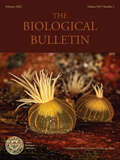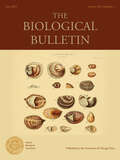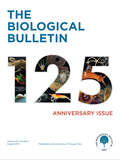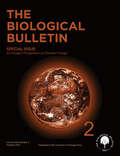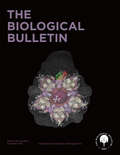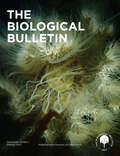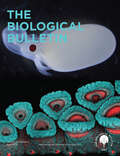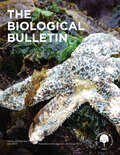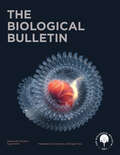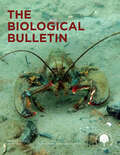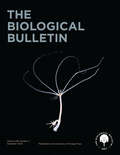- Table View
- List View
The Biochemistry of Retinoid Signaling III: Vitamin A and Retinoic Acid in Embryonic Development (Subcellular Biochemistry #95)
by Mary Ann Asson-Batres Cecile Rochette-EglyThis book covers subjects that have major impacts on society, such as the mechanism of maternal-fetal transfer of vitamin A, and the effects of alcohol on retinoic acid signaling and mammalian embryonic development. There has been an awareness of the importance of consuming vitamins throughout human history, but empirical studies of their physiological role and mode of action only began about 150 years ago. Since then, the biochemical nature of vitamin A and its active derivative, retinoic acid, have been identified and researchers around the globe have investigated retinoic acid’s physiological function in growth processes and in maintaining life Written by leading experts, this book discusses the latest findings and advances in retinoic acid research. It addresses topics such as the role of retinoic acid signaling in a multitude of processes, including limb, heart and respiratory system development, as well as its role in maintaining postnatal organ systems. This book is a valuable resource for scientists involved in vitamin A/retinoic acid research and readers interested in developmental biology.
The Biodemography of Ageing and Longevity
by Jean-François Lemaître Samuel PavardWhy and how we age are probably two of science's oldest questions, echoing personal beliefs and concerns about our own finitude. From the earliest musings of ancient philosophers to recent pharmacological trials aimed at slowing ageing and prolonging longevity, these questions have fascinated scientists across time and fields of research. Taking advantage of the natural diversity of ageing trajectories, within and across species, this interdisciplinary volume provides a comprehensive view of the recent advances in ageing and longevity through a biodemographic approach. It includes the key facts, theories, ongoing fields of investigation, big questions, and new avenues for research in ageing and longevity, as well as considerations on how extending longevity integrates into the social and environmental challenges that our society faces. This is a useful resource for students and researchers curious to unravel the mysteries of longevity and ageing, from their origins to their consequences, across species, space and time.
The Biodiversity Observation Network in the Asia-Pacific Region
by Shin-Ichi Nakano Tetsukazu Yahara Tohru NakashizukaBiological diversity is important for ecosystem function and services, which in turn is essential for human well-being. Under the Convention on Biological Diversity, international efforts have been made to achieve a significant reduction in the current rate of biodiversity loss. The loss continues, however. The Asia-Pacific region includes both developing countries with high biodiversity and developed countries with sophisticated data collection and analyses, but only limited information about the status quo of biodiversity in this region has been available. Many Asia-Pacific countries have rapidly grown their economies and social infrastructures, causing a loss of biodiversity and requiring an urgent mandate to achieve a balance between development and conservation in the region. In December 2009, scientists successfully organized the Asia-Pacific Biodiversity Observation Network in the region, to establish a network for research and monitoring of ecosystems and biodiversity and to build a cooperative framework. The present volume is the first collection of information on biodiversity in the Asia-Pacific and represents a quantum step forward in science that optimizes the synergy between development and biodiversity conservation.
The Biodynamics of the Immune System: Balancing the Energies of the Body with the Cosmos
by Michael J. SheaBiodynamic therapy practices for optimizing the immune system and healing the spiritual suffering at the root of many modern ailments• Examines the need to restore balance to the immune system through a deeper spiritual connection to the energies of the universe• Shares unique biodynamic protocols to balance the metabolism with the cosmos as well as optimize the immune system and the function of the vagus nerveDrawing on more than 45 years of practicing Eastern medicine, Michael J. Shea, Ph.D., presents a holistic guide to biodynamic manual therapy practices for optimizing the immune system and for healing the deep spiritual suffering of our contemporary world. Showing spiritual suffering to be the root of our modern epidemic of metabolic syndrome and other widespread health issues, the author explains how the pervasive degradation of the human body relates directly with the food we eat, the air we breathe, and our thoughts and emotions. He explains how the Five Element theory of Eastern medicine offers a method to reclaim the body by sensing each element in and around us as a single continuum. Focusing especially on &“the fluid body&” in biodynamic osteopathy and biodynamic craniosacral therapy, the author shows how inflamed components of the fluid body, such as the blood and lymphatic system, form the substrate of metabolic syndromes. He offers practices to visualize the health of the fluid body. He explains how, in order to enact the full benefits of the immune system, we need to nurture a deep sense of safety inside the body--a symbolic return to our embryonic and cosmic origins and a restoration of our sacred wholeness. Offering an extensive section of therapeutic applications, including both in-person and remote techniques, the author shares new and unique biodynamic protocols to balance the metabolism with the cosmos as well as optimize the immune system and the function of the vagus nerve. Enacting healing at the deepest spiritual level, Shea reveals how to create inner and outer balance to restore wholeness as it was at the time of the origin of the universe.
The Bioeconomy Approach: Constraints and Opportunities for Sustainable Development (Routledge Studies in Food, Society and the Environment)
by Udaya Sekhar NagothuThis book examines the bioeconomy concept, analysing the opportunities it can generate, the constraints and the potential benefits for society. The main objective of bioeconomy is to promote economic development, by creating jobs and enhancing the sustainable utilization of bio-resources. A primary driver of bioeconomy strategy, therefore, is the need to respond to the growing population's food and economic requirements. While today research and literature related to bioeconomy are limited, this book presents a unique collection of perspectives on the complex dimensions of the bioeconomy debate. Drawing on the experiences from Europe, Asia and Africa, it presents an international overview. The chapters address a wide range of issues, including coastal-land interactions, ecosystem services, food production, rural development, agriculture, forest management and bioenergy. As a whole, the volume outlines what role bioeconomy can play in contributing to the United Nations Sustainable Development Goals (SDGs) without compromising on the ecological sustainability and equitable distribution of benefits. The book concludes by providing recommendations for developing bioeconomy in respective sectors (agriculture, forestry, fisheries, renewable energy) and directions for planning future bioeconomy programmes and strategies. The Bioeconomy Approach will be of great interest to students and scholars of ecological economics, development economics and environmental economics, as well as policy-makers and practitioners involved in sustainable development.
The Bioeconomy: Delivering Sustainable Green Growth
by Davide ViaggiThe 'bioeconomy' is the idea of an economy based on the sustainable exploitation of biological resources. Within this concept, there is increasing emphasis on issues such as climate change, depletion of natural resources and growing world food needs. The bioeconomy builds on the recognition of advances in technology, particularly in the life sciences, but at the same time covers issues such as innovation management, ecosystem services, development and governance. This book explores the development of the bioeconomy across the world from an economic and policy perspective, as well as identifying potential future pathways and issues. It uses a broad definition, covering all sectors using biological resources except health, and rather than focusing on individual sectors, it explores the breadth of interconnections that make the bioeconomy a new and challenging subject. Divided into two parts, the book initially outlines the current definitions, strategies, policy and economic information related to the world's bioeconomy. The second part describes current economic analysis and research efforts in qualifying and understanding the economics of the bioeconomy. This includes the contributions of technology, research and innovation; driving forces and demand-side economics; supply-side economics, and the role of markets and public policy in matching demand and supply. The political economy, regulation and transitions are considered, as well as the contribution of the bioeconomy to society, including growth, development and sustainability. Key features include: - An analysis of varied international approaches to the bioeconomy. - A joint consideration of biotechnology, agriculture, food energy and bio-materials. - An assessment of sustainability in the bioeconomy. - A comprehensive view of the issues from an economic and policy perspective. This book will be of interest to students and researchers in agricultural and natural resource economics, agricultural and environmental policy, as well as policy-makers, practitioners and economists.
The Bioeconomy: Delivering Sustainable Green Growth
by Davide ViaggiThe 'bioeconomy' is the idea of an economy based on the sustainable exploitation of biological resources. Within this concept, there is increasing emphasis on issues such as climate change, depletion of natural resources and growing world food needs. The bioeconomy builds on the recognition of advances in technology, particularly in the life sciences, but at the same time covers issues such as innovation management, ecosystem services, development and governance. This book explores the development of the bioeconomy across the world from an economic and policy perspective, as well as identifying potential future pathways and issues. It uses a broad definition, covering all sectors using biological resources except health, and rather than focusing on individual sectors, it explores the breadth of interconnections that make the bioeconomy a new and challenging subject. Divided into two parts, the book initially outlines the current definitions, strategies, policy and economic information related to the world's bioeconomy. The second part describes current economic analysis and research efforts in qualifying and understanding the economics of the bioeconomy. This includes the contributions of technology, research and innovation; driving forces and demand-side economics; supply-side economics, and the role of markets and public policy in matching demand and supply. The political economy, regulation and transitions are considered, as well as the contribution of the bioeconomy to society, including growth, development and sustainability. Key features include: - An analysis of varied international approaches to the bioeconomy. - A joint consideration of biotechnology, agriculture, food energy and bio-materials. - An assessment of sustainability in the bioeconomy. - A comprehensive view of the issues from an economic and policy perspective. This book will be of interest to students and researchers in agricultural and natural resource economics, agricultural and environmental policy, as well as policy-makers, practitioners and economists.
The Biogeography of the British Isles: An Introduction (Routledge Library Editions: Ecology #17)
by Peter VincentOriginally published in 1990, The Biogeography of the British Isles is devoted to the biogeography of the British Isles and surrounding shelf seas. Bringing together a wealth of diverse information, it is thoroughly referenced and well illustrated, and will be invaluable to students of geography, environmental science, ecology, botany, and zoology. The book traces the development of British biogeography over the last two centuries, examining key topics such as ecosystems, habitats, and niches in the context of plant and animal distribution. The book gives a detailed account of the development of biogeographical mapping and recording systems, and describes modern-day distributions, both in the countryside and in urban areas against the backcloth of human activities.
The Bioinorganic Chemistry of Chromium
by John VincentChromium exists in nature as complexes of two stable oxidation states - trivalent chromium(III) and hexavalent chromium(VI). Although trivalent chromium is required in trace amounts for sugar and lipid metabolism in humans and its deficiency may cause a disease called chromium deficiency; hexavalent chromium is toxic and carcinogenic. As chromium compounds were used in dyes and paints and the tanning of leather, these compounds are often found in soil and groundwater at abandoned industrial sites, now needing environmental cleanup and remediation.The Bioinorganic Chemistry of Chromium: From Biochemistry to Environmental Toxicology takes a critical look at what the biochemical data indicate about chromium's role in the body and the biological mechanisms of its toxicology. Topics covered include:What do we know about the biochemical roles and mechanisms of chromium?Is chromium an essential element in the mammalian diet?Is chromium(III) effective as a nutraceutical, a therapeutic agent, and as a supplement in animal feed?What is the biochemistry behind the toxicology of chromium(III) and chromium(VI):the mechanisms of metabolism, genetic and epigenetic effects, and disruption of cell signalling?What are the current chromium(VI) policies and positions from regulatory agencies?The Bioinorganic Chemistry of Chromium: From Biochemistry to Environmental Toxicology is an important contribution to the bioinorganic and trace element biochemical fields which will find a place on the bookshelves of bioinorganic chemists, biochemists, inorganic chemists, toxicologists, nutritionists and regulatory affairs professionals.
The Biological Activity of Phytochemicals
by David R GangThis is the first volume to be published under a new series agreement for Recent Advances in Phytochemistry, co-published with the Phytochemical Society of North America.
The Biological Bases of Economic Behaviour: A Concise Introduction
by David McFarlandHuman genetics has changed little over the past 20,000 years, but human economic behaviour has changed a lot. These changes are probably due to human cultural evolution. But studies of human hunter-gatherers, and of a variety of other animal species, show that their micro-economic behaviour is much the same. Whereas the standard economic analysis focuses on money, the biological approach brings time and energy into the analysis. Moreover, humans and other animals tested under laboratory conditions do not exhibit the complexity of the results of field studies. In other words, results obtained in the real world are not the same as those obtained in the laboratory. <P><P> The Biological Bases of Economic Behaviour invites readers to approach micro-economics from a biological viewpoint, in a clear and introductory manner.
The Biological Basis of Human Behavior: A Critical Review (Second Edition)
by Robert W. SussmanThis collection of 59 recent studies on the biological basis of human behavior explores the questions of whether the behavioral patterns we see are genetically fixed or racially variable. It offers a broad perspective from many disciplines -- plus a critical evaluation of whether experts are now better able to answer these questions or whether this renewed interest is just a resurgence of the old racism and biological determinism of the past. The articles stimulate readers to think about the questions and read -- with a critical eye -- those writers who believe they have found a simple and simplistic answer to these very complex problems. Illustrates the growing awareness of the complex interrelationships between environmental and cultural influences on behavior in humans and other animals. Covers areas such as evolution, humans, and primates; the biological basis of human behavior; the biological basis of race and racism; the new Biological Determinism; the brain, hormones, and human behavior. Includes popular, scientific, good and bad approaches to the same themes. Uses critical examples which carefully evaluate alternate approaches, and evaluates the data available to reach various conclusions -- or lack thereof. For anyone interested in the biological basis of human behavior.
The Biological Bulletin, volume 241 number 2 (October 2021)
by The Biological BulletinThis is volume 241 issue 2 of The Biological Bulletin. The Biological Bulletin disseminates novel scientific results in broadly related fields of biology in keeping with more than 100 years of a tradition of excellence. The Bulletin publishes outstanding original research with an overarching goal of explaining how organisms develop, function, and evolve in their natural environments. To that end, the journal publishes papers in the fields of Neurobiology and Behavior, Physiology and Biomechanics, Ecology and Evolution, Development and Reproduction, Cell Biology, Symbiosis and Systematics. The Bulletin emphasizes basic research, including articles on marine model systems and those of an interdisciplinary nature.
The Biological Bulletin, volume 241 number 3 (December 2021)
by The Biological BulletinThis is volume 241 issue 3 of The Biological Bulletin. The Biological Bulletin disseminates novel scientific results in broadly related fields of biology in keeping with more than 100 years of a tradition of excellence. The Bulletin publishes outstanding original research with an overarching goal of explaining how organisms develop, function, and evolve in their natural environments. To that end, the journal publishes papers in the fields of Neurobiology and Behavior, Physiology and Biomechanics, Ecology and Evolution, Development and Reproduction, Cell Biology, Symbiosis and Systematics. The Bulletin emphasizes basic research, including articles on marine model systems and those of an interdisciplinary nature.
The Biological Bulletin, volume 242 number 1 (February 2022)
by The Biological BulletinThis is volume 242 issue 1 of The Biological Bulletin. The Biological Bulletin disseminates novel scientific results in broadly related fields of biology in keeping with more than 100 years of a tradition of excellence. The Bulletin publishes outstanding original research with an overarching goal of explaining how organisms develop, function, and evolve in their natural environments. To that end, the journal publishes papers in the fields of Neurobiology and Behavior, Physiology and Biomechanics, Ecology and Evolution, Development and Reproduction, Cell Biology, Symbiosis and Systematics. The Bulletin emphasizes basic research, including articles on marine model systems and those of an interdisciplinary nature.
The Biological Bulletin, volume 242 number 3 (June 2022)
by The Biological BulletinThis is volume 242 issue 3 of The Biological Bulletin. The Biological Bulletin disseminates novel scientific results in broadly related fields of biology in keeping with more than 100 years of a tradition of excellence. The Bulletin publishes outstanding original research with an overarching goal of explaining how organisms develop, function, and evolve in their natural environments. To that end, the journal publishes papers in the fields of Neurobiology and Behavior, Physiology and Biomechanics, Ecology and Evolution, Development and Reproduction, Cell Biology, Symbiosis and Systematics. The Bulletin emphasizes basic research, including articles on marine model systems and those of an interdisciplinary nature.
The Biological Bulletin, volume 243 number 1 (August 2022)
by The Biological BulletinThis is volume 243 issue 1 of The Biological Bulletin. The Biological Bulletin disseminates novel scientific results in broadly related fields of biology in keeping with more than 100 years of a tradition of excellence. The Bulletin publishes outstanding original research with an overarching goal of explaining how organisms develop, function, and evolve in their natural environments. To that end, the journal publishes papers in the fields of Neurobiology and Behavior, Physiology and Biomechanics, Ecology and Evolution, Development and Reproduction, Cell Biology, Symbiosis and Systematics. The Bulletin emphasizes basic research, including articles on marine model systems and those of an interdisciplinary nature.
The Biological Bulletin, volume 243 number 2 (October 2022)
by The Biological BulletinThis is volume 243 issue 2 of The Biological Bulletin. The Biological Bulletin disseminates novel scientific results in broadly related fields of biology in keeping with more than 100 years of a tradition of excellence. The Bulletin publishes outstanding original research with an overarching goal of explaining how organisms develop, function, and evolve in their natural environments. To that end, the journal publishes papers in the fields of Neurobiology and Behavior, Physiology and Biomechanics, Ecology and Evolution, Development and Reproduction, Cell Biology, Symbiosis and Systematics. The Bulletin emphasizes basic research, including articles on marine model systems and those of an interdisciplinary nature.
The Biological Bulletin, volume 243 number 3 (December 2022)
by The Biological BulletinThis is volume 243 issue 3 of The Biological Bulletin. The Biological Bulletin disseminates novel scientific results in broadly related fields of biology in keeping with more than 100 years of a tradition of excellence. The Bulletin publishes outstanding original research with an overarching goal of explaining how organisms develop, function, and evolve in their natural environments. To that end, the journal publishes papers in the fields of Neurobiology and Behavior, Physiology and Biomechanics, Ecology and Evolution, Development and Reproduction, Cell Biology, Symbiosis and Systematics. The Bulletin emphasizes basic research, including articles on marine model systems and those of an interdisciplinary nature.
The Biological Bulletin, volume 244 number 1 (February 2023)
by The Biological BulletinThis is volume 244 issue 1 of The Biological Bulletin. The Biological Bulletin disseminates novel scientific results in broadly related fields of biology in keeping with more than 100 years of a tradition of excellence. The Bulletin publishes outstanding original research with an overarching goal of explaining how organisms develop, function, and evolve in their natural environments. To that end, the journal publishes papers in the fields of Neurobiology and Behavior, Physiology and Biomechanics, Ecology and Evolution, Development and Reproduction, Cell Biology, Symbiosis and Systematics. The Bulletin emphasizes basic research, including articles on marine model systems and those of an interdisciplinary nature.
The Biological Bulletin, volume 244 number 2 (April 2023)
by The Biological BulletinThis is volume 244 issue 2 of The Biological Bulletin. The Biological Bulletin disseminates novel scientific results in broadly related fields of biology in keeping with more than 100 years of a tradition of excellence. The Bulletin publishes outstanding original research with an overarching goal of explaining how organisms develop, function, and evolve in their natural environments. To that end, the journal publishes papers in the fields of Neurobiology and Behavior, Physiology and Biomechanics, Ecology and Evolution, Development and Reproduction, Cell Biology, Symbiosis and Systematics. The Bulletin emphasizes basic research, including articles on marine model systems and those of an interdisciplinary nature.
The Biological Bulletin, volume 244 number 3 (June 2023)
by The Biological BulletinThis is volume 244 issue 3 of The Biological Bulletin. The Biological Bulletin disseminates novel scientific results in broadly related fields of biology in keeping with more than 100 years of a tradition of excellence. The Bulletin publishes outstanding original research with an overarching goal of explaining how organisms develop, function, and evolve in their natural environments. To that end, the journal publishes papers in the fields of Neurobiology and Behavior, Physiology and Biomechanics, Ecology and Evolution, Development and Reproduction, Cell Biology, Symbiosis and Systematics. The Bulletin emphasizes basic research, including articles on marine model systems and those of an interdisciplinary nature.
The Biological Bulletin, volume 245 number 1 (August 2023)
by The Biological BulletinThis is volume 245 issue 1 of The Biological Bulletin. The Biological Bulletin disseminates novel scientific results in broadly related fields of biology in keeping with more than 100 years of a tradition of excellence. The Bulletin publishes outstanding original research with an overarching goal of explaining how organisms develop, function, and evolve in their natural environments. To that end, the journal publishes papers in the fields of Neurobiology and Behavior, Physiology and Biomechanics, Ecology and Evolution, Development and Reproduction, Cell Biology, Symbiosis and Systematics. The Bulletin emphasizes basic research, including articles on marine model systems and those of an interdisciplinary nature.
The Biological Bulletin, volume 245 number 2 (October 2023)
by The Biological BulletinThis is volume 245 issue 2 of The Biological Bulletin. The Biological Bulletin disseminates novel scientific results in broadly related fields of biology in keeping with more than 100 years of a tradition of excellence. The Bulletin publishes outstanding original research with an overarching goal of explaining how organisms develop, function, and evolve in their natural environments. To that end, the journal publishes papers in the fields of Neurobiology and Behavior, Physiology and Biomechanics, Ecology and Evolution, Development and Reproduction, Cell Biology, Symbiosis and Systematics. The Bulletin emphasizes basic research, including articles on marine model systems and those of an interdisciplinary nature.
The Biological Bulletin, volume 245 number 3 (December 2023)
by The Biological BulletinThis is volume 245 issue 3 of The Biological Bulletin. The Biological Bulletin disseminates novel scientific results in broadly related fields of biology in keeping with more than 100 years of a tradition of excellence. The Bulletin publishes outstanding original research with an overarching goal of explaining how organisms develop, function, and evolve in their natural environments. To that end, the journal publishes papers in the fields of Neurobiology and Behavior, Physiology and Biomechanics, Ecology and Evolution, Development and Reproduction, Cell Biology, Symbiosis and Systematics. The Bulletin emphasizes basic research, including articles on marine model systems and those of an interdisciplinary nature.
